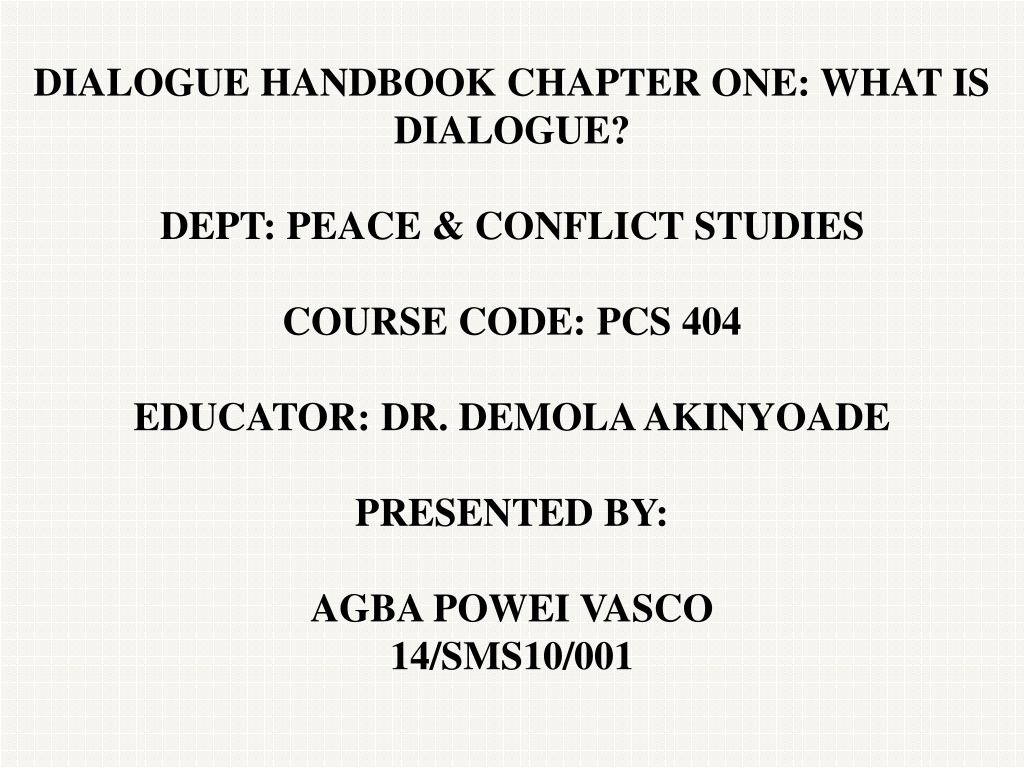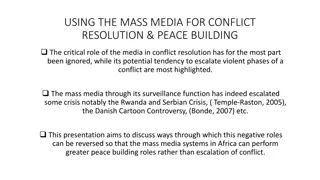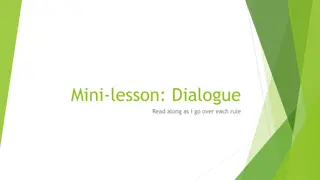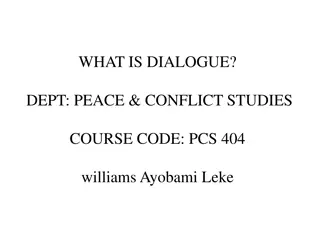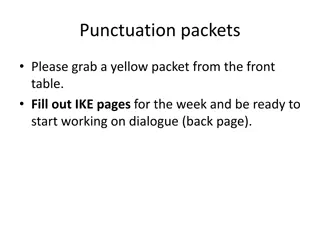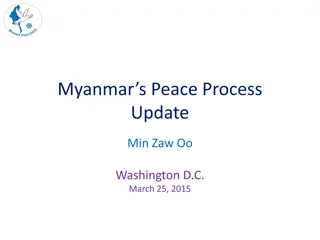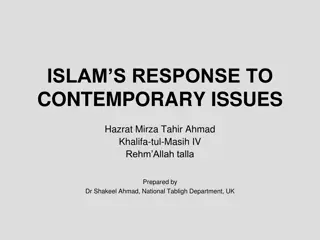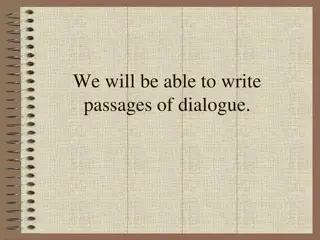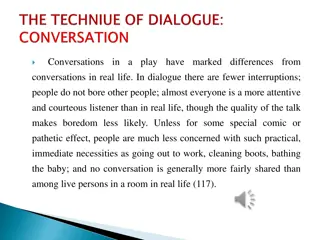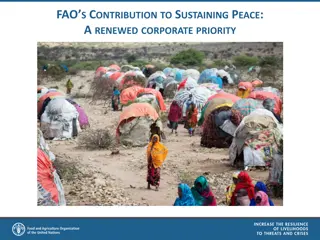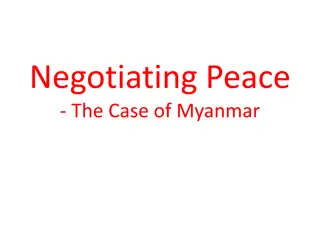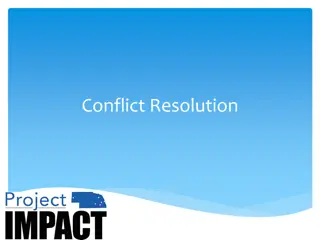Understanding the Essence of Dialogue in Peace and Conflict Studies
Dialogue, derived from the Greek term "dialogos," encompasses more than mere conversation. It is a unique form of communication where participants actively seek mutual understanding and deeper insights. Key principles include trust, openness, honesty, and equality. Understanding the nature of dialogue involves embracing basic values, maintaining a dialogical frame of mind, and practicing effective communication methods.
Download Presentation

Please find below an Image/Link to download the presentation.
The content on the website is provided AS IS for your information and personal use only. It may not be sold, licensed, or shared on other websites without obtaining consent from the author. Download presentation by click this link. If you encounter any issues during the download, it is possible that the publisher has removed the file from their server.
E N D
Presentation Transcript
DIALOGUE HANDBOOK CHAPTER ONE: WHAT IS DIALOGUE? DEPT: PEACE & CONFLICT STUDIES COURSE CODE: PCS 404 EDUCATOR: DR. DEMOLA AKINYOADE PRESENTED BY: AGBA POWEI VASCO 14/SMS10/001
Table of content What is dialogue? Principle of dialogue The nature of dialogue Basic dialogical values Dialogical frame of mind Dialogical practice Discussion or dialogue or both Two types of discussion Dialogue as an active choice Conclusion Reference
What is dialogue? Etymologically, the term dialogue was derived from Greek word called dialogos, which means through the word (dia = through and logos = word). In everyday language, the term is widely used in the same sense as conversation , but dialogue is more than just talking to one another. Dialogue is a special form of communication, in which participants seek to actively create greater mutual understanding and deeper insight. The followings are some of the elements in the definition of dialogue according to the material. i. special form of communication ii. participants seek to actively create iii. greater mutual understanding iv. deeper insight
Principle of dialogue There are four basic principles which together make up the foundation on which the dialogue rests. They are; trust, openness, honesty and equality. i. Trust: When there is trust between persons in communication, it is easier to express opposing views. One party listens, while the other feels heard. ii. Openness: Openness is both being honest about what you represent and being open to what the other suggests. It help you to understand the others view. iii. Honesty: Honesty is about authenticity in being who you are, both in your words and your way of being. It build trust while dishonest bring mistrust. iv. Equality: Dialogue is based on the value that everybody has something to say, regardless of status, gender, ethnic background, etc. In a dialogue everybody joins in on an equal footing. Everybody has the same right of viewpoint.
The nature of dialogue Dialogue must come from the heart whereby helping others to conducting dialogue. You need to believe and understand the three dimensions of the nature of dialogue. i. Basic dialogical values: What do I believe? What is my view of human nature? For what do I want to use dialogue and why? These are relevant questions to ask yourself in the effort to develop your own basic dialogical values. ii. Dialogical frame of mind: Do we want to fight and win? Or do we want to enter into a dialogue and try to understand? A dialogical frame of mind entail a willingness to be open, exploratory and dialogical towards others, even in the face of profound disagreement. iii. Dialogical practice: We also face a fundamental choice. What do we want to achieve through our communication? And how do we want to communicate in practice?
Two types of discussion i. Destructive discussion: people do not listening attentively. You focus on preparing your next argument and wait mainly to have your say. It does not lead to very much except deadlocked positions. It does not break any new ground. This type of discussion is outright damaging and fuels conflict. ii. Constructive discussion: Dialogical principles of trust, openness, honesty and equality are upheld. People listen with a frame of mind that is open, inquiring and patient enough to digest both their own and the other s arguments. Respectful negotiations may lead to a compromise or a win- win solution.
Dialogue as an active choice Here, dialogue is either in its pure form or hand in hand with some type of sober argumentation, can help make decisions better thought-through, more participatory and enduring. Accordingly, dialogue is not exclusively a means of creating understanding between fellow human beings, though this is meaningful enough in itself. Dialogue is a valuable tool in all the contexts in which we need to reach agreement and take concrete and well-founded decisions in order to act. Not least in the context of democracy. There are only two ways of solving a conflict. You can fight it out and let the strongest prevail. Or you can talk it through and use conversation to arrive at a more balanced and reasonable understanding of theproblem behind the conflict. The latter is democracy. Hal Koch (1904-1963), Danish philosopher and democrat, declared in 1948.
Conclusion Dialogue is an opportunity that we can deliberately choose to take in order to handle differences between us in a more constructive and beneficial manner. Dialogue is necessary in a modern world characterised by contrast and change. This is a world where we meet each other, want to cooperate and indeed have to do so, across borders, cultures, viewpoints and motivations. Dialogue can help overcome prejudice and create understanding of other people s perspectives. It can show us new ways of perceiving the world. And it can expand our horizon. Dialogue enables reaching across an abyss of difference, as long as we see and recognise each other for what we are: different yet all human beings in the same world.
Reference Pcs 404 class material
THANK U 4 LISTENING
